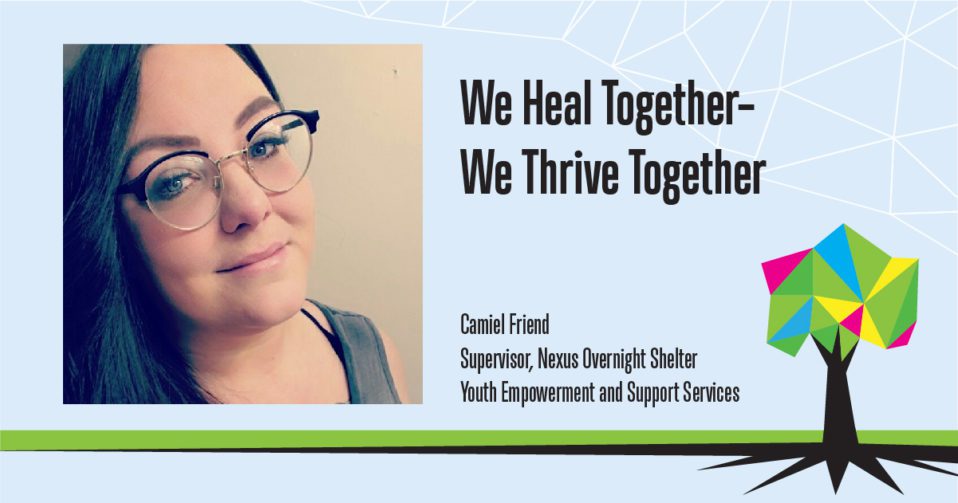Describe where this program fits in YESS’ mission to walk beside youth on their journeys towards healing.
First and foremost, Nexus meets the very basic needs of our youth (food, water, showers, clothing, bed) to eliminate the stress associated with inconsistent access to resources which meet these needs. We provide stability by being a predictable and stable environment that the youth can rely on, no matter the circumstances or what day of the year it is. The format of the program remains consistent, while still allowing for the leniency where we can truly meet a youth where they are at and accommodate any barriers they may be dealing with. We act as the first response to crisis diversion when crises arise, and function as a triage, using our relationships with the youth and the community to complete warm handoffs to other resources if Nexus cannot meet the needs of the youth. Nexus’ top priority is safety and operates with a focus on the physical safety as well as the felt-safety of every client in the program. Nexus staff build relationships with each youth through co-creation of boundaries and unconditional positive regard that allows the youth to make mistakes and learn from them in a safe environment that is free of judgment. Relationships are fostered and strengthened through relational practice where the youths can learn about rupture, repair, and healthy attachment via relationships with staff members. Communication initiated by staff is done in a tone of curiosity and acceptance, and any support or guidance is youth-led rather than imposed by staff. The program expectations that are enforced are intended to model healthy communication and life skills, such as respectful conflict resolution or even basic hygiene practices.
In what ways has the COVID-19 crisis affected youth and staff in this program?
The COVID-19 pandemic has created a huge amount of anxiety and fear for both the youth and the staff, as we all collectively endure this global trauma. It has fundamentally destabilized the youth’s felt-safety by disrupting their physical, relational, cultural, and legal permanency. Their routines have been forced to change as the places they typically hang out in are unavailable, government offices are closed, cultural practices or events have been cancelled, and they are consistently reminded of the importance of isolating themselves from loved ones. The number of resources available to our youth has greatly decreased, including day programs and housing options, causing feelings of despair, helplessness, and being trapped. Since the precautions for the pandemic have been implemented, we have seen an increase in mental health concerns, leading to more frequent emotional disregulation and outbursts, an increase in suicidal ideation and drug use, as well as a decrease in connection between youth and staff. The policies that are necessary to reducing viral exposure such as social distancing, reduced contact between staff and youth, and wearing masks have created systemic and environmental barriers which prevent relationship building and maintenance. These policies are enforced in a more black and white manner than program policies typically are, changing the environment of the shelter from authoritative to authoritarian, which has the potential to cause strain on relationships. This may also amplify the youth’s existing feelings of rejection, loneliness, and loss. Last but not least, the widespread communication that we must isolate for the safety of others only acts to reaffirm the youth’s internalized worthlessness, which has long since been established by the experience of having their needs consistently disregarded and being marginalized by society.
What is one thing you wish the wider community knew about YESS youth?
They are humans who deserve the same amount of respect, compassion, and regard as any other human. They are young adults between the ages of 15-25, each being a unique individual with their own goals, talents, and personalities. They are smart, funny, kind, caring, strong, and incredibly resilient. They do not deserve the traumas associated with homelessness or addiction. They do not deserve to be judged or disregarded by society.


Post a comment